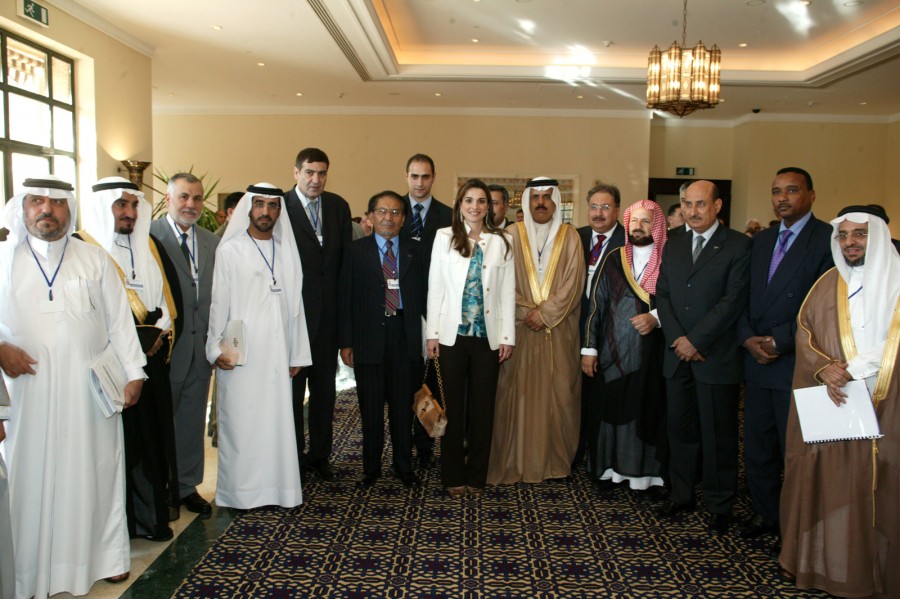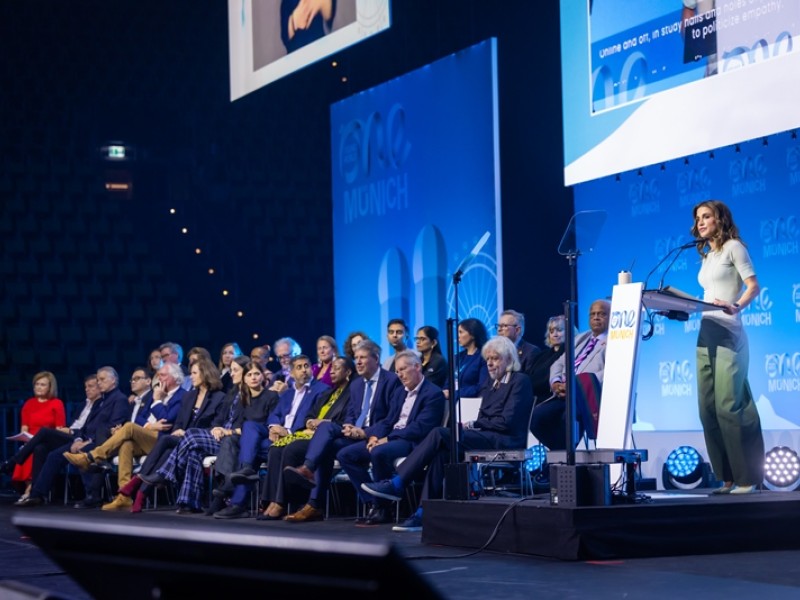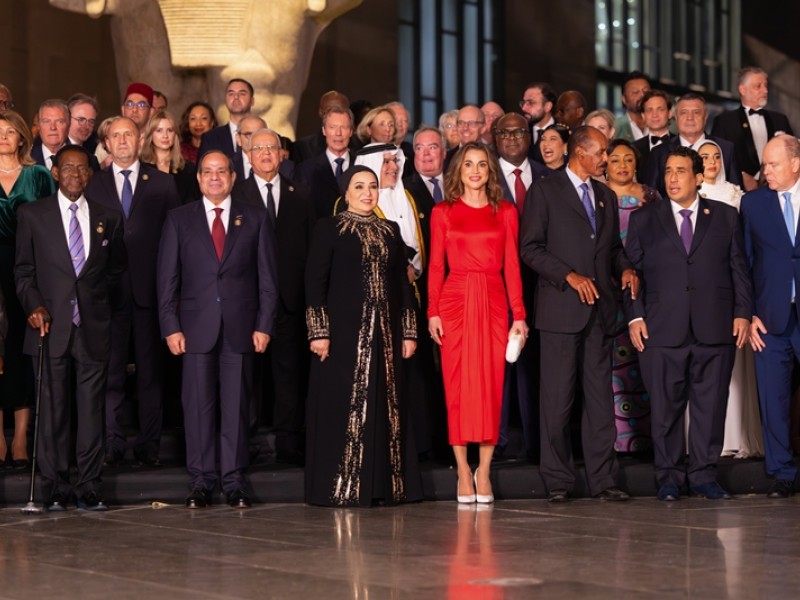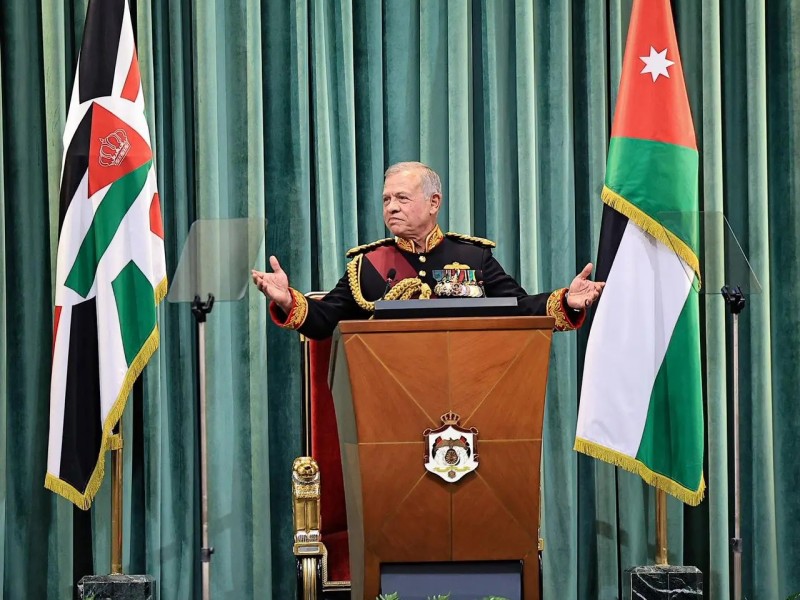Queen Rania Highlights Education as a Tool to Turn Challenges to Opportunities During Closing Session of Arab, G8 Ministerial Meeting on Education

(Office of Her Majesty – Press Department – Dead Sea) - Arab and Group of Eight (G8) ministers of education joined forces, during the last two days, to explore educational reform prospects that will ensure that students in the region have access to high quality education, at a conference on the development of education. Attending Monday’s closing ceremony of the Broader Middle East and North Africa (BMENA) Region and G8 Ministers’ of Education meeting, Her Majesty Queen Rania underlined the vital role of education in development of societies - an underlying theme at the World Economic Forum which concluded at the Dead Sea on Sunday.
With 70% per cent of the Arab World under the age of 30, Queen Rania noted the region’s need to create 50 million jobs in the next five years, emphasizing education is a vital tool to meet that challenge. “The recommendations you have come up with are practical and needed. Implementing and institutionalizing them are needed to keep the momentum,” said Queen Rania commended the meeting’s endorsement of a framework for progress which will be reviewed at the next ministerial meeting scheduled to be held in Rabat, Morocco in 2006.
The two-day BMENA/G8 ministerial meeting, held on the sidelines of WEF, is an opportunity to focus on factors of success in the educational process, building partnerships, empowering women and deploying IT in special education, according to Minister of Education, Higher Education and Scientific Research Dr. Khalid Touqan. Highlighting that substantial progress had been achieved, Dr. Touqan said there was a long path ahead. “Let us build and maintain the momentum to activate the necessary partnerships in the areas of challenge and priority identified and plan to exceed the existing and meet the new targets which we have begun to define. Let the fruits of this meeting be another beginning,” he added. The first of its kind in the Arab world, the meeting was held under the theme of “Quality and Equality: Filling the Gaps Together”.
It provided participating countries, including, Algeria, Bahrain, Egypt, Iraq, Mauritania, Morocco, Yemen and Jordan, amongst others, with the opportunity to present their recent experiences in, and future plans for, managing the educational demands of their societies, within the following themes, set forth during their London meeting in February 2005: Critical Success Factors for Educational Reform, Literacy and Access, Social Inclusion and Quality and Relevance of Education. Recommendations endorsed include reviewing progress regularly, reaffirming commitment to reduce illiteracy by half by 2015, encouraging national policies for inclusion in particular girls and those with special needs, and bringing together government, private sector and civil society to address education quality and relevance including linking learning outcomes to employment opportunities and citizen participation. During the meeting, Jordan presented its national educational initiative.
Launched in 2003, at the World Economic Forum, by Cisco CEO, John Chambers, the Jordan Education Initiative (JEI) is an innovative e-learning project, developed out of a partnership between Jordan and Cisco Systems and stands as an educational model, which entails a range of classes conducted on computers to reach thousands of teachers, students and community members at less cost. The project includes the following programs: World Links Intel Teach to the Future Programs, Maktabati Al Arabiya (My Arabic Library), International Education Resources Network (IEARN), CISCO Networking Academy and Health Academy Class.
The World Links Program is an International Cooperation tool used by both students and teachers in ICT learning, which also introduces scalable, effective, and less expensive alternatives to learning. The initiative comes at a time when the region is faced with the challenge of creating 50 million jobs in the next five years, so as to cater for the 146 million workers who will seek employment. The project has exceeded expectations. JEI spent much of 2004 delivering curriculum into the classrooms. Right now, the math curriculum, developed by one of CISCO's partner companies on the initiative, Jordan-based Rubicon, is being used in 13 of 100 Discovery Schools. Since February 2005, 37 Discovery Schools in Jordan received the curriculum, with the remainder delivered by the end of the school year. Additional accomplishments include training of 25 teachers on the Intel Teach to the Future Programs, who obtained the International Computer Driving License (ICDL) certificate. The project has also equipped 95% of the Kingdom’s schools with one computer lab, at least.
Furthermore, there are, at present, approximately 90,000 computers in schools, distributed all over the country - a figure, which, according to the Ministry of Education, is expected to increase in the near future. Partners in the Jordanian initiative include: Cisco Systems, Dell, Hewlett-Packard and France Telecom, amongst others. Also on Monday, Queen Rania also met US education Secretary Ms. Margaret Spellings, French Education Minister Mr. Francois Fillon and UK School Minister Ms Jacqui Smith. Discussion focused on areas of cooperation, specifically in the area of teacher training.
Ministers shared with Queen Rania their impressions upon visiting two E-learning schools in the Jordan Valley on the sidelines of their meetings at the Dead Sea.
Featured
Queen Rania's official website
This website does not support old browsers. To view this website, Please upgrade your browser to IE 9 or greater
Your browser is out of date. It has known security flaws and may not display all features of this and other websites. Learn how to update your browser



